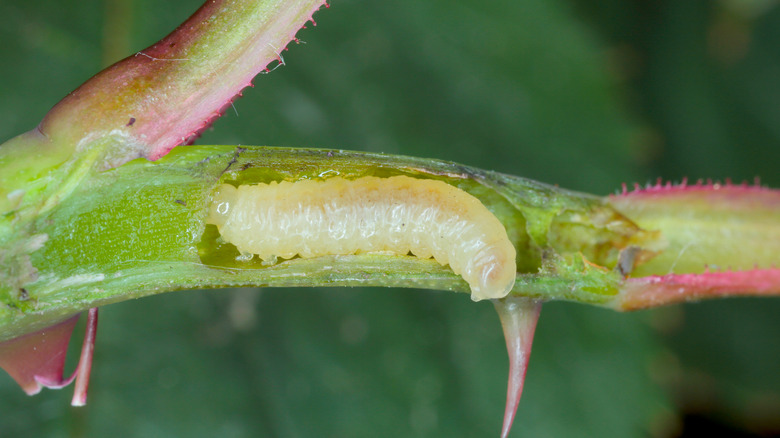The Nasty Rose Pest That Shows Up More In The Fall
Roses are a beautiful staple of many gardens. While growing roses isn't necessarily difficult, it does take quite a bit of attention and care to make sure they stay healthy throughout every season. This is especially true in seasons when your roses may be more susceptible to certain pests, like in the fall. There are many reasons why you should consider pruning your roses in the fall, but there is one major downside to consider if you do: pests. Roses are particularly susceptible to rose cane borers right after they have been pruned.
There are many gardening mistakes to avoid to get more blooms from your roses, and not paying attention to these little bugs could be one of the worst. These pests can be extremely damaging to rose bushes, but not all hope is lost. There are simple steps you can take to prevent rose cane borers from invading your rose bushes throughout the fall.
What are rose cane borers?
Rose cane borers aren't just one pest; they are actually a type of pest. The term rose cane borer covers all types of insects and larvae that bore into the canes of flowers, especially roses. They are usually a type of beetle or moth larva that lives in the stem, eating away the nutrients. Common types of rose cane borers that you might have a problem with include bees, wasps, raspberry horntails, stem boring sawflies, rose stem girdlers, and flathead borers.
You may not be able to see signs of these pests taking over your roses in the fall because they are in the egg or larva state, but they love the fresh cut ends of newly pruned roses. There, they stay in the canes, unseen. Some of these pests, like sawflies, are hunted by other pests like parasitic wasps, which can also create chaos in your garden come fall.
What rose cane borers can do to your roses (and how to prevent it)
So, what's the big deal? How much damage can one tiny little larva do anyway? Unfortunately, these nasty pests can do a lot of harm to your roses before you even know they are there. Rose cane borers don't just take up residence in the stem; they steal from it as well. They burrow into what is called the pith, which is the center of the cane that holds all the nutrients for the blooms. Depending on the type of borer that your plant has become infested with, you may see a few canes die, or they could kill the entire plant.
As you care for your roses in the fall to prepare for winter, you can add one simple step to your to-do list to prevent rose cane borers from taking over. After pruning, cover the fresh cut ends with glue. This will prevent the borers from being able to get into the pith. If you already have a problem with cane borers, cut away the diseased part of the stem and seal the end with glue. That's it!


